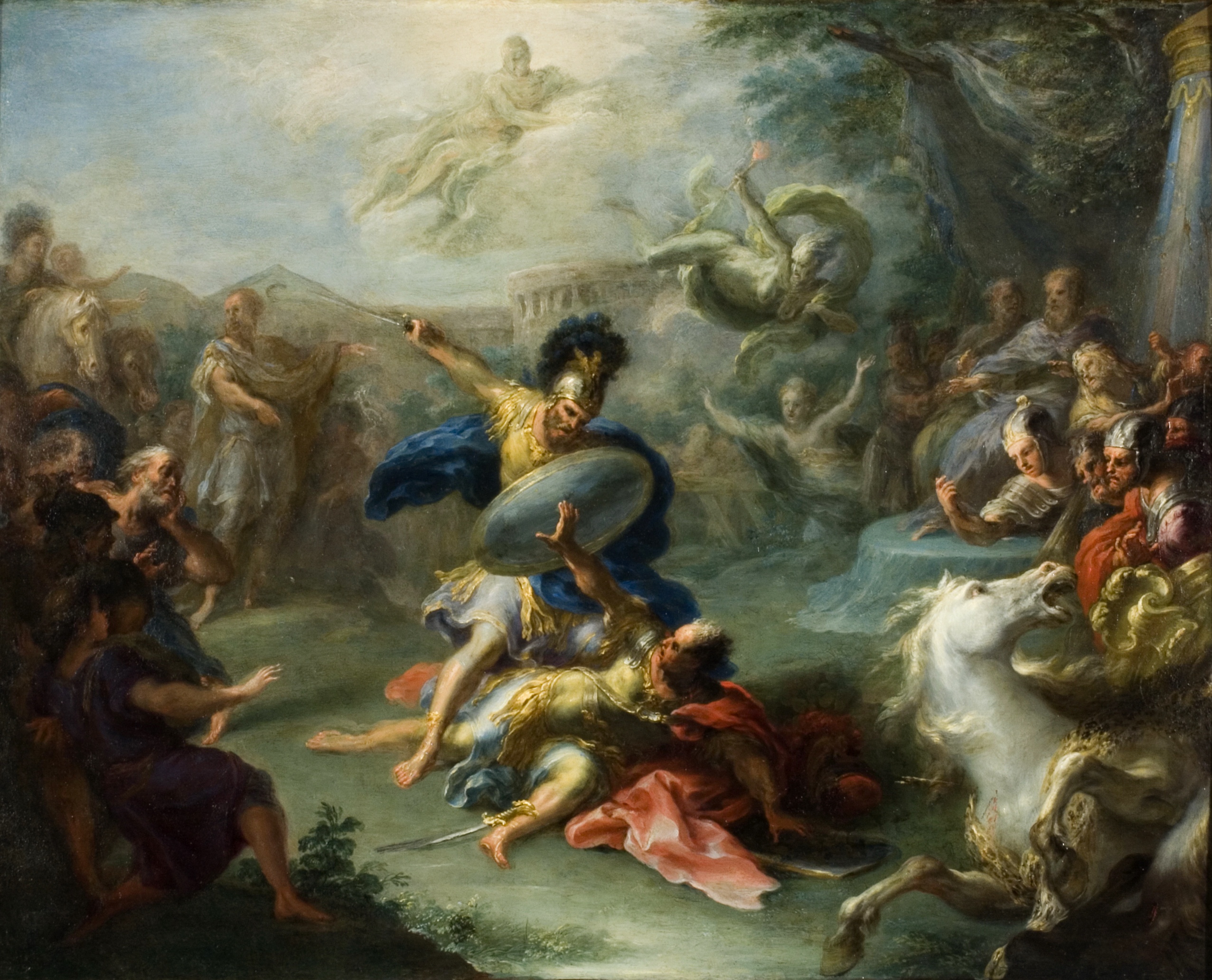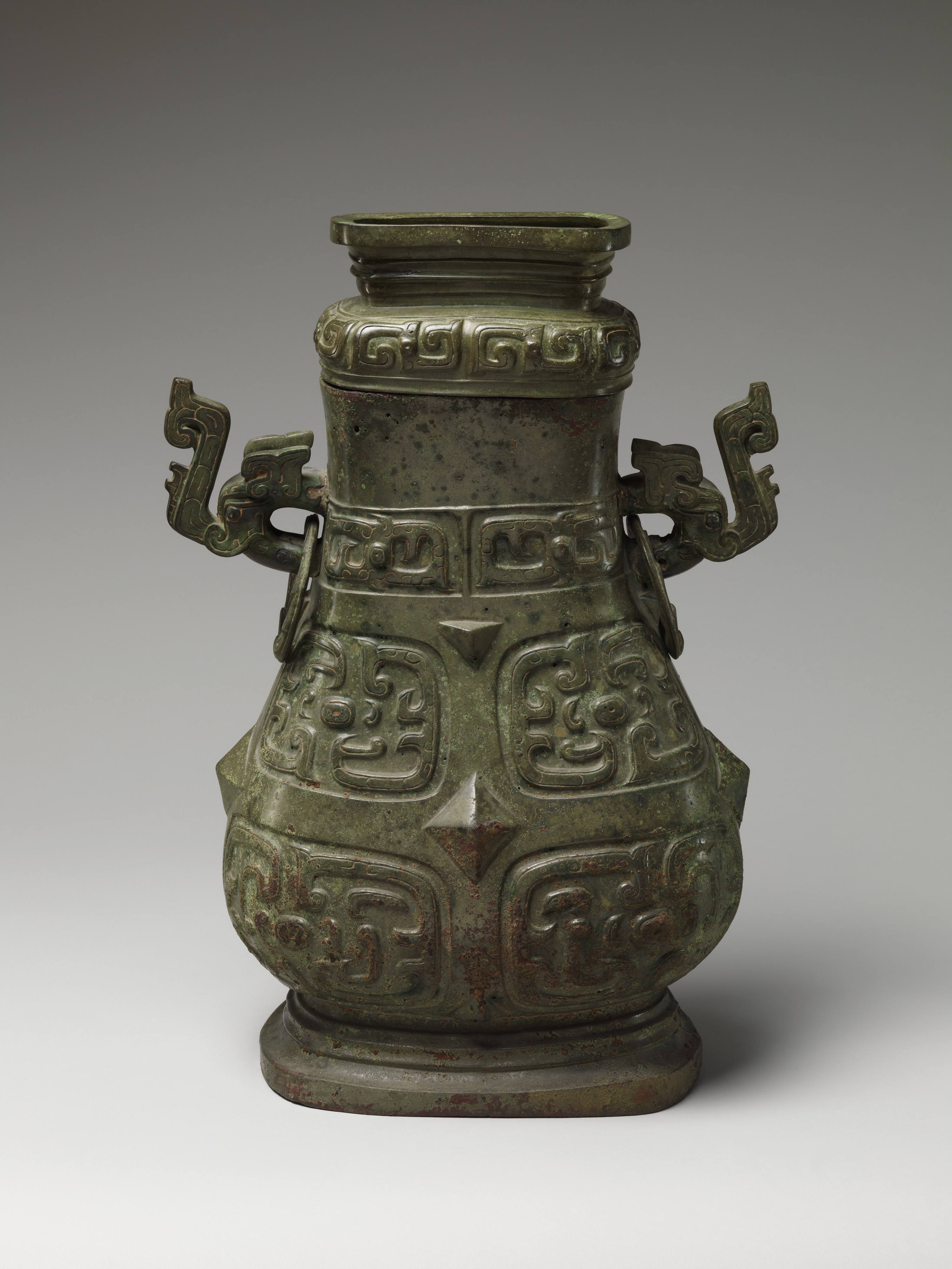There are also six Homeric metals; substances which are highly reactive, not only with other substances but with abstract concepts, such as evil, life, or honesty. No small number of magical or cursed items are made from one of these metals. These are what an ancient Greek hero, flush with funds from the latest conquest, would make spearheads or chariot wheels out of.
These were initially inspired by a footnote in Patrick Stuart's Veins of the Earth, of which I am a known fanboy.
 |
| The Fight Between Aeneas and King Turnus, Giacomo del Po |
Illium
The lightest of the Homeric metals, and the one with the rarest antagonist: heroism. Heroism in an antiquated sense, that of someone who takes immense risks for glory, rather than one who is especially moral. Illium seeks out the destruction of the great and powerful, in proportion to their greatness. In game terms, Illium weapons have +1 to hit and +1 damage per level (or hit die) of the target. Against 0-level peasants, it has no effect. Against kings and legendary adventurers, it's a death blow. Other items forged from Illium similarly seem to lead to the downfall of the mighty; Illium jewelry tempts them to their doom, Illium armor breaks unexpectedly, Illium tools build contrivedly faulty products.
Illium is nearly impossible to find, as the gods realized it could be used to utterly destroy them, and hid it deep in the bowels of the earth, smelting it with impure substances to dilute it. Multiple apocalyptic prophecies reference a vault in the earth that unleashes god-doom upon the world. The meaning of these prophecies is suppressed.
 |
| An oxidized orichalcum coin, stamped with blessings and placed under the tongue of a corpse |
Orichalcum
The legendary mountain copper of Atlantis, possessed of a shiny, white color and opalescent texture. According to ancient metallurgical texts, the metal was possessed of a vital essence, for which it was specially valued in funeral rites. Coffins coated in orichalcum could keep wicked dead from rising, and orichalcum-tipped spears and arrows were employed in warding off evil spirits. An orichalcum weapon deals +1 damage to undead, and can touch incorporeal beings.
The orichalcum mines dried up even before Atlantis fell to the ocean, and it has largely been relegated to legend. Some intrepid tomb-robbers have dug up old graves to scrape off the shiny white metals that coat them. They don't often make it back.
Homeric Iron
Iron must be quenched in blood. It alone among the Homeric metals is honest about its purpose, and refuses any form which does not cause harm. Creatures which hold on to Homeric iron hear its siren call towards violence. When a blade of Homeric iron is unsheathed, there can be no parley. Old soldiers cast iron lots to decide who charges the enemy line. A set of iron dice thrown in a gambling match end in a bloodbath. Any such item which does not cause bodily harm to a thinking being will conspire to do so.
It is no more effective at killing than normal iron, but loves doing so. For each Homeric iron item held, the character or party in question suffers -1 reaction rolls. Iron weapons begin with Ego 10, which increases daily until it is used for violence, and prompts Wisdom checks against its holder. Homeric iron is all too easy to make; bury the metal inside a dying man until his spirit leaves him. Many family heirlooms are made of Homeric iron without the knowledge of their brash, confrontational inheritors.
 |
| Blessed Bronze serving vessel, employed by ancient royalty |
Blessed Bronze
A violent disinfectant, antagonistic to life on the micro and macro scales. Anticrobial. A blessed bronze weapon deals +1 damage, but also disinfects all wounds with a scathing sensation. Blessed bronze-coated blades can be used to wipe down surfaces, and exceptionally valuable vessels made from blessed bronze slowly purifies any pollutant or poison contained within.
Ancient texts claim it can be produced at great expense, but only by master metallurgists who imbue the bronze with prayers at each stage of smelting. Modern attempts to recreate it have failed, and blessed bronze today is most often found in wrecks and ruins.
Firegold
Properly called pyrite, firegold exhibits a slow exothermic reaction on contact with other precious metals. Gold, silver and platinum, and bronze and copper to a lesser extent, cause pyrite to burn at temperatures well in excess of 2000 degrees centigrade, melting these lesser metals to sludge. Though fierce, the reaction takes a substantial amount of time to build up; a pyrite coin might be in your coin pouch for a few days before it suddenly bursts into flame and burns you to the bone. The reaction is accelerated by contact with more valuable metals, or by being surrounded by a critical amount.
The uses of this 'moron's gold' are few, besides sabotage and cruel pranks. Some claim that this is not a physical reaction at all, but a metaphysical opposition to wealth. Experiments using precious jewels have returned promising results, but nobody will fund them. Designs for highly destructive explosive devices have been drawn up, but powering them would require literally burning money, and no military needs to win that badly.
| An old crusader's oath inscribed on an oath-tin coin Worn around the neck on a chain or thong |
Oath-Tin: Highly malleable, and the most easily worked of all the Homeric metals. It doesn't react violently on contact with other materials per se, but rather on contact with dishonesty. Hermetic and mystical orders employ Oath-tin in amulets and phylacteries, inscribed on them the tenets of their oaths. If these principles are bent or twisted, the metal becomes hot to touch. If they are outright broken, the metal and its wearer spontaneously combust. Note that these violations can be committed by anybody nearby, not just the wearer. This is a very useful tool for cults to keep their members from contact with outsiders.
Oath-tin is mined exclusively by the dwarves. It is not solely found at depth, but rather is difficult for non-dwarves to manipulate, as the ore is less stable than the purified metal and has a habit of exploding whenever a hypocrite is nearby. Most non-dwarves qualify.
Oghmanessium: The seventh Homeric metal, which does not occur naturally. Its hypothetical existence is posited by 'Chymists' a rogue school of heretical wizards with a fetish for theoretical alchemy. They claimed to have synthesized it, but have provided no samples. If it indeed existed, it would be expected to have a violent reaction to anything ugly; bad art, poor taste and inadequate morals.
That is seven wonderful pieces of wonderbuilding and loot. Fantastic work.
ReplyDeleteAh, but what of Mithril, the impervious? Regium, which reacts only to presence of royalty? Or possibly fabled Heliospar, the metal of condensed sunlight? Fund my grant application, and I will pursue the missing two Homeric Metals, to ensure they align with the Eightfold Theory.
ReplyDeleteFunded. The occultum is on its way to you. Great things are expected.
Delete-Dean of the College of Chymistry